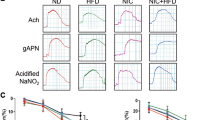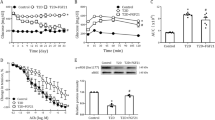Abstract
Objective:
Hypoadiponectinemia has been proved to be closely related to endothelial dysfunction in peripheral arteries and is thought to be an independent risk factor for cardiovascular disease. The objective of this study was to investigate whether adiponectin might independently improve endothelial dysfunction in aorta isolated from high-fat-diet-induced obese. Sprague-Dawley rat and to study the mechanism involved.
Research Design and Subjects:
Male Sprague-Dawley rats were fed with a regular or a high-fat diet for 6 weeks. The aorta was isolated, and vascular segments were incubated with vehicle or the globular adiponectin (globular domain (gAD); 2 mg ml−1) for 2 h. The effect of gAD on endothelial function and nitric oxide (NO) production was determined. Human aortic endothelial cells in primary culture were treated with vehicle or gAD (4 mg ml−1). The effect of gAD on the level of phosphorylation of endothelial nitric oxide synthase (eNOS) at Ser1177, AMPK at Thr176 and Akt at Ser473 in endothelial cells were determined.
Results:
Severe endothelial dysfunction was observed in high-fat diet fed rat aortic segments. After gAd incubation, the endothelium-dependent relaxation was partly improved and total production of nitric oxide as result of enhanced eNOS activity was also increased. In the cultured endothelial cell line HUVEC, globular adiponectin increased the activity of eNOS through activating AMPK by stimulating its phosphorylation at Thr176 but not Akt.
Conclusion:
The demonstration in the current study that adiponectin reverses endothelial dysfunction through increasing NO production by eNOS phosphorylation, and decreasing NO inactivation by blocking superoxide production provides a new direction in the prevention of vascular injury in the obesity population.
This is a preview of subscription content, access via your institution
Access options
Subscribe to this journal
Receive 12 print issues and online access
$259.00 per year
only $21.58 per issue
Buy this article
- Purchase on Springer Link
- Instant access to full article PDF
Prices may be subject to local taxes which are calculated during checkout




Similar content being viewed by others
References
Ross R . The pathogenesis of atherosclerosis: a perspective for the 1990s. Nature 1993; 362: 801–809.
Bonetti PO, Lerman LO, Lerman A . Endothelial dysfunction—A marker of atherosclerotic risk. Arterioscler Thromb Vasc Biol 2003; 23: 168–175.
Pierce GL, Beske SD, Lawson BR, Southall KL, Benay FJ, Donato AJ et al. Weight loss alone improves conduit and resistance artery endothelial function in young and older overweight/obese adults. Hypertension 2008; 52: 72–79.
Burke GL, Bertoni AG, Shea S, Tracy R, Watson KE, Blumenthal RS et al. The impact of obesity on cardiovascular disease risk factors and subclinical vascular disease: the Multi-Ethnic Study of Atherosclerosis. Arch Intern Med 2008; 168: 928–935.
Al Suwaidi J, Higano ST, Holmes Jr DR, Lennon R, Lerman A . Obesity is independently associated with coronary endothelial dysfunction in patients with normal or mildly diseased coronary arteries. J Am Coll Cardiol 2001; 37: 1523–152.
Kawashima S, Yokoyama M . Dysfunction of endothelial nitric oxide synthase and atherosclerosis. Arterioscler Thromb Vasc Biol 2004; 24: 998–1005.
Lavi S, Yang EH, Prasad A, Mathew V, Barsness GW, Rihal CS et al. The interaction between coronary endothelial dysfunction, local oxidative stress, and endogenous nitric oxide in humans. Hypertension 2008; 51: 127–133.
Touyz RM, Schiffrin EL . Reactive oxygen species in vascular biology: implications in hypertension. Histochem Cell Biol 2004; 122: 339–352.
Okui H, Hamasaki S, Ishida S, Kataoka T, Orihara K, Fukudome T et al. Adiponectin is a better predictor of endothelial function of the coronary artery than HOMA-R, body mass index, immunoreactive insulin, or triglycerides. Int J Cardiol 2008; 126: 53–61.
Shimabukuro M, Higa N, Asahi T, Oshiro Y, Takasu N, Tagawa T et al. Hypoadiponectinemia is closely linked to endothelial dysfunction in man. J Clin Endocrinol Metab 2003; 88: 3236–3240.
Chow WS, Cheung BMY, Tso AWK, Xu AM, Wat NMS, Fong CHY et al. Hypoadiponectinemia as a predictor for the development of hypertension—A 5-year prospective study. Hypertension 2007; 49: 1455–1461.
Koenig W, Khuseyinova N, Baumert J, Meisinger C, Lowel H . Serum concentrations of adiponectin and risk of type 2 diabetes mellitus and coronary heart disease in apparently healthy middle-aged men: results from the 18-year follow-up of a large cohort from southern Germany. J Am Coll Cardiol 2006; 48: 1369–1377.
Kumada M, Kihara S, Sumitsuji S, Kawamoto T, Matsumoto S, Ouchi N et al. Association of hypoadiponectinemia with coronary artery disease in men. Arterioscler Thromb Vasc Biol 2003; 23: 85–89.
Everett SA, Dennis MF, Tozer GM, Prise VE, Wardman P, Stratford MRL . Nitric-oxide in biological-fluids—analysis of nitrite and nitrate by high-performance ion chromatography. In: Heftmann E (ed). 7th International Ion Chromatography Symposium (IICS 94). Elsevier Science BV: Turin, Italy, 1994. pp 437–442.
Calles-Escandon J, Cipolla M . Diabetes and endothelial dysfunction: a clinical perspective. Endocr Rev 2001; 22: 36–52.
Ouchi N, Ohishi M, Kihara S, Funahashi T, Nakamura T, Nagaretani H et al. Association of hypoadiponectinemia with impaired vasoreactivity. Hypertension 2003; 42: 231–234.
Ouedraogo R, Gong Y, Berzins B, Wu X, Mahadev K, Hough K et al. Adiponectin deficiency increases leukocyte–endothelium interactions via upregulation of endothelial cell adhesion molecules in vivo. J Clin Invest 2007; 117: 1718–1726.
Ohashi K, Kihara S, Ouchi N, Kumada M, Fujita K, Hiuge A et al. Adiponectin replenishment ameliorates obesity-related hypertension. Hypertension 2006; 47: 1108–1116.
Chen H, Montagnani M, Funahashi T, Shimomura I, Quon MJ . Adiponectin stimulates production of nitric oxide in vascular endothelial cells. J Biol Chem 2003; 278: 45021–45026.
Hattori Y, Suzuki M, Hattori S, Kasai K . Globular adiponectin upregulates nitric oxide production in vascular endothelial cells. Diabetologia 2003; 46: 1543–1549.
Xi W, Satoh H, Kase H, Suzuki K, Hattori Y . Stimulated HSP90 binding to eNOS and activation of the PI3–Akt pathway contribute to globular adiponectin-induced NO production: vasorelaxation in response to globular adiponectin. Biochem Biophys Res Commun 2005; 332: 200–205.
Motoshima H, Wu X, Mahadev K, Goldstein BJ . Adiponectin suppresses proliferation and superoxide generation and enhances eNOS activity in endothelial cells treated with oxidized LDL. Biochem Biophys Res Commun 2004; 315: 264–271.
Ouedraogo R, Wu X, Xu SQ, Fuchsel L, Motoshima H, Mahadev K et al. Adiponectin suppression of high glucose-induced reactive oxygen species in vascular endothelial cells: evidence for involvement of a cAMP signaling pathway. Diabetes 2006; 55: 1840–1846.
Cao Y, Tao L, Yuan Y, Jiao X, Lau WB, Wang Y et al. Endothelial dysfunction in adiponectin deficiency and its mechanisms involved. J Mol Cell Cardiol 2009; 46: 413–419.
Davis BJ, Xie Z, Viollet B, Zou MH . Activation of the AMP-activated kinase by antidiabetes drug metformin stimulates nitric oxide synthesis in vivo by promoting the association of heat shock protein 90 and endothelial nitric oxide synthase. Diabetes 2006; 55: 496–505.
Ouchi N, Kobayashi H, Kihara S, Kumada M, Sato K, Inoue T et al. Adiponectin stimulates angiogenesis by promoting cross-talk between AMP-activated protein kinase and Akt signaling in endothelial cells. J Biol Chem 2004; 279: 1304–1309.
Brook RD, Bard RL, Rubenfire M, Ridker PM, Rajagopalan S . Usefulness of visceral obesity (waist/hip ratio) in predicting vascular endothelial function in healthy overweight adults. Am J Cardiol 2001; 88: 1264–1269.
Yamauchi T, Kamon J, Waki H, Imai Y, Shimozawa N, Hioki K et al. Globular adiponectin protected ob/ob mice from diabetes and ApoE-deficient mice from atherosclerosis. J Biol Chem 2003; 278: 2461–2468.
Montagnani M, Chen H, Barr VA, Quon MJ . Insulin-stimulated activation of eNOS is independent of Ca2+ but requires phosphorylation by Akt at Ser(1179). J Biol Chem 2001; 276: 30392–30398.
Wu XD, Motoshima H, Mahadev K, Stalker TJ, Scalia R, Goldstein BJ . Involvement of AMP-activated protein kinase in glucose uptake stimulated by the globular domain of adiponectin in primary rat adipocytes. Diabetes 2003; 52: 1355–1363.
Acknowledgements
This study was supported by grants from National Natural Science Foundation of China (No. 30570874 and No. 30370679).
Author information
Authors and Affiliations
Corresponding author
Rights and permissions
About this article
Cite this article
Deng, G., Long, Y., Yu, YR. et al. Adiponectin directly improves endothelial dysfunction in obese rats through the AMPK–eNOS Pathway. Int J Obes 34, 165–171 (2010). https://doi.org/10.1038/ijo.2009.205
Received:
Revised:
Accepted:
Published:
Issue Date:
DOI: https://doi.org/10.1038/ijo.2009.205
Keywords
This article is cited by
-
Periconceptional biomarkers for maternal obesity: a systematic review
Reviews in Endocrine and Metabolic Disorders (2023)
-
Understanding diabetes-induced cardiomyopathy from the perspective of renin angiotensin aldosterone system
Pflügers Archiv - European Journal of Physiology (2022)
-
Potential role of epicardial adipose tissue as a biomarker of anthracycline cardiotoxicity
Insights into Imaging (2021)
-
Current perspectives of oleic acid: Regulation of molecular pathways in mitochondrial and endothelial functioning against insulin resistance and diabetes
Reviews in Endocrine and Metabolic Disorders (2020)
-
Fibroblast growth factor 21 Ameliorates diabetes-induced endothelial dysfunction in mouse aorta via activation of the CaMKK2/AMPKα signaling pathway
Cell Death & Disease (2019)



